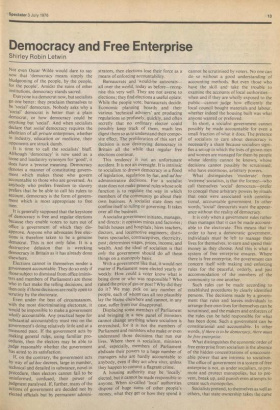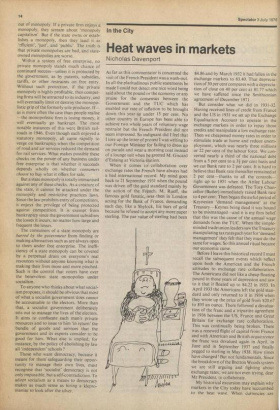Democracy and Free Enterprise
Shirley Robin Letwin
Not even Oscar Wilde would dare to say now that 'democracy means simply the bludgeoning of the people, by the people, for the people'. Amidst the ruins of other institutions, democracy stands sacred.
Everyone is a democrat now, but socialists go one better: they proclaim themselves to be 'social' democrats. Nobody asks why a 'social' democrat is better than a plain democrat, or how democracy could be anything but 'social'. And when socialists declare that social democracy requires the abolition of all private enterprises, whether in industry, education or medicine, their Opponents are struck dumb.
It is time to call the socialists' bluff. Although 'democracy' is now used as a loose and laudatory synonym for 'good', it does have a precise meaning. Democracy denotes a manner of constituting government which makes those who govern accountable to those who are governed. As anybody who prefers freedom to slavery prefers that he be able to call his rulers to account, democracy is the form of government which is most appropriate to free men.
It is generally supposed that the keystone of democracy is free and regular elections because they enable voters to turn out of office a government of which they disapprove. Anyone who advocates free elections is therefore taken to be a genuine democrat. This is not only false. It is a destructive delusion that is wrecking democracy in Britain as it has already done elsewhere.
Elections cannot in themselves render a government accountable. They do so only it' those subject to dismissal from office (ministers and members of Parliament) are those Who in fact make the telling decisions, and then only if those decisions are really open to scrutiny by the electorate.
Even under the best of circumstances, With the most discriminating electorate, it would be impossible to make a government Wholly accountable. Any practical hope for substantial accountability must rest on the government's doing relatively little and at a measured pace. If the government acts by making general rules, using familiar procedures, then the electors may be able to Judge reasonably whether the government has acted to its satisfaction.
on the contrary, the government acts by way of ad hoc decrees, large in number, technical and detailed in substance, novel in
Procedure, then electors cannot fail to be uninformed, confused, their power of judgment paralysed. If, further, many of the actions of government are decided not by elected officials but by permanent admini strators, then elections lose their force as a means of enforcing accountability.
Bureaucrats and would-be autocrats— all over the world, today as before—recognise this very well. They are not averse to elections; they find elections a useful opiate. While the people vote, bureaucrats decide. Economic planning boards and their various 'technical advisers' are producing regulations so profusely, quickly, and often secretly that no ordinary elector could possibly keep track of them, much less digest them so as to understand their composite effect. The proliferation of this sort of decision is now destroying democracy in Britain all the while that regular free elections continue.
This tendency is not an unfortunate accident. It is not an oversight. It is intrinsic to socialism to drown democracy in a flood of legislation, regulation by fiat, and ad hoc administrative decisions. For a socialist state does not make general rules whose sole function is to regulate the way in which members of the community go about their own business. A socialist state does not confine itself to ruling or governing. It takes over all the business.
A socialist government initiates, manages, and directs: it operates mines and factories; builds houses and hospitals; hires teachers, doctors, and locomotive engineers; distributes spectacles, contraceptives, electricity, post ; determines wages, prices, income, and wealth. And the ideal of socialism is that only the government should do all these things on a monopoly basis.
With a government like that, it would not matter if Parliament were elected yearly or weekly. How could a voter know what is being done or who was responsible? Who raised the price of gas or post ? Why did they do it ? We may pick on any number of people, each of whom can all too plausibly lay the blame elsewhere and cannot, in any case, suffer from our disapproval.
Displacing some members of Parliament and bringing in a new panel of ministers cannot change anything where socialism is entrenched, for it is not the members of Parliament and ministers who make or even understand those decisions that run our lives. Where there is socialism, ministers and, especially, members of Parliament abdicate their powers to a huge number of managers who are hardly accountable to anybody, even if they act ultra vires, unless they happen to commit a flagrant crime.
A housing authority may be 'locally' elected, but it cannot be made responsible to anyone. When so-called 'local' authorities dispose of huge sums of other people's money, what they get or how they spend it cannot be scrutinised by voters. No one can do so without a good understanding of accounting methods. But even those who have the skill and take the trouble to examine the accounts of local authorities-when and if they are wholly exposed to the public—cannot judge how efficiently the local council bought materials and labour, whether indeed the housing built was what anyone wanted or preferred.
In short, a socialist government cannot possibly be made accountable for even a small fraction of what it does. The pretence of socialists to care about democracy is necessarily a sham because socialism signi fies a set-up in which the lives of grown men and women are managed for them by people whose identity cannot be known„ whose decisions cannot possibly be scrutinised, who have enormous, arbitrary powers.
What distinguishes 'moderate' from 'extreme' socialists, is that the former—who call themselves 'social' democrats—prefer to conceal these arbitrary powers by rituals that once were associated with constitu tional, accountable government. In other words, 'social' democrats want the appearance without the reality of democracy.
It is only when a government rules rather than manages that it can be made account able to the electorate. This means that in order to have a democratic government. individuals must be left to manage their lives for themselves, to earn and spend their money as they choose. And this is what a system of free enterprise ensures. Where there is free enterprise, the government can concern itself with making and enforcing rules for the peaceful, orderly, and just accommodation of the members of the community to one another.
Such rules can be made according to established procedures by clearly identified persons. The decisions made by a govern ment that rules and leaves, individuals to arrange their own lives for themselves can be scrutinised, and the makers and enforcers of the rules can be held responsible for what has been done. Such a government can be
constitutional and accountable. In other words, if there is to be democracy, there must be free enterprise.
What distinguishes the economic order of free enterprise from socialism is the absence of the hidden concentrations of unaccount able power that are intrinsic to socialism. The office of government in a system of free enterprise is not, as under socialism, to promote and protect monopolies, but to prevent, break up, and punish even attempts to create such monopolies.
Socialists pretend, to themselves as well as others, that state ownership takes the curse
out of monopoly. If a private firm enjoys a monopoly, they scream about :monopoly capitalism'. But if the state owns or establishes a monopoly, then they laud it as ',.-Ificiene, 'just', and 'public'. The truth is that private monopolies are bad, and stateowned monopolies are worse.
Within a system of free enterprise, no private monopoly stands much chance of continued success—unless it is protected by the government, as by patents, subsidies, tariffs, or other restraints on free entry. Without such protection, if the private monopoly is highly profitable, then competing firms will be attracted to its industry, and will eventually limit or destroy the monopolistic grip of the formerly sole producer. If— as is more often the case than people realise — -the monopolistic firm is losing money, it will eventually go bankrupt. The most notable instances of this were British railroads in 1946. Even though each enjoyed a statutory monopoly, all came rapidly to verge on bankruptcy when the competition of road and air services reduced the demand for rail services. What makes possible these checks on the power of any business under free enterprise is that whether it succeeds depends wholly on whether consumers choose to buy what it offers for sale.
But a state monopoly is totally immunised against any of these checks. As a creature of the state, it cannot be attacked under the monopoly and restrictive practices laws. Since the law prohibits entry of competitors, it enjoys the privilege of being protected against competition. It is exempt from bankruptcy since the government subsidises the losses it incurs, no matter how large and frequent the losses.
The consumers of a state monopoly are barred by the government from finding or making alternatives such as are always open to them under free enterprise. The inefficiency of a state monopoly can be covered by a perpetual drain on everyone's real resources without anyone knowing what is making their lives more and more pinched. Such is the control that voters have over the benevolent state monopolies under socialism.
To anyone who thinks about what socialism proposes, it should be obvious that most of what a socialist government does cannot be accountable to the electors. More than that, a socialist government deliberately sets out to manage the lives of the electors. It aims to confiscate each man's private resources and to issue to him 'in return' the bundle of goods and services that the government and its experts consider to be. good for him. What else is implied, for instance, by the policy of abolishing by law all 'independent' schools?
Those who want democracy, because it means for them safeguarding their opportunity to manage their own lives, must recognise that 'socialist' democracy is not only impossible, but a self-contradiction. To adopt socialism as a means to democracy makes as much sense as hiring a kleptomaniac to look after the silver.



































 Previous page
Previous page